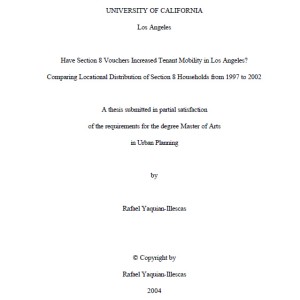
Authors: Rafael Yaquian-Illescas
Date: June 1, 2004
Project: [wpv-post-link id=”$project”]
n the 1990s housing mobility became a popular strategy for improving the lives of the poor. That decade, Los Angeles was chosen to participate in the U.S. Department of Housing and Urban Development’s “Moving to Opportunity” demonstration project that encouraged poor persons living in segregated low-income neighborhoods to move to neighborhoods with reduced racial segregation and less concentrated poverty. Congress expanded that program and established the Housing Choice Voucher program with the intent of deconcentrating poverty by increasing tenant residential mobility. This thesis evaluates the program’s success in deconcentrating low-income households in Los Angeles.
This thesis examines changes in locational distribution of Section 8 participant households in the Los Angeles region between 1997 and 2002 by neighborhood poverty rate (NPR). The analysis appraises the effects of race and ethnicity on participant household mobility. A rental market analysis is included to review the effects of housing markets on participant household mobility. Findings indicate that in Los Angeles, Section 8 participant household mobility decreased between 1997 and 2002. Data indicate voucher usage in affluent and lowpoverty neighborhoods has decreased by almost 40 percent and that voucher usage in very-poor neighborhoods increased by 27 percent. Data indicate that persistent race based discrimination affect mobility for Section 8 participant households in Los Angeles. Black households were the most likely to live in very-poor neighborhoods and over half of Latino participant households live in poor neighborhoods. The analyses point to the need for a reevaluation of efforts to deconcentrate poor urban families in Los Angeles.
Link to Publication